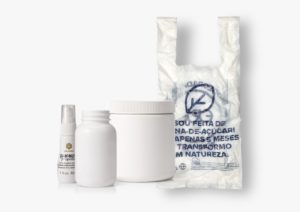São Paulo – For at least 20 years, Brazil has been producing and using bioplastics as a substitute for products of fossil origin. Two decades later, one of the main associations in the sector, the Brazilian Association of Compostable Biopolymers and Composting (ABICOM), assesses the environment is favorable for the country to have a growth rate above the global average. The worldwide estimate is for the bioplastics industry to more than triple its production capacity in the next five years. Data is from European Bioplastic, and the most recent report was released in December 2021.
For Karina Daruich, executive director of ABICOM, national agricultural production makes the Brazilian context more fertile for this industry, which uses vegetable materials as the most abundant and low-cost inputs. “In Brazil, we believe the percentage of growth could be even higher [than global expectations], considering investments already announced. The country could become a world platform for biopolymers,” explained Daruich in a telephone interview.

Among the distinct types of biopolymers, one of the main ones is produced with a renewable source; however, it is not compostable; it takes the same time as ordinary plastic to decompose in the environment. In Brazil, one of the primary biopolymer industries of this type is Braskem, which operates under the brand ‘I’m green bio-based.’ The company’s product is made from sugarcane ethanol and has been produced on an industrial and commercial scale since 2010.
Two other types, which are under the ABICOM association, are compostable biopolymers. These can be from renewable or fossil sources, but both decompose fast when appropriately discarded. Although these sustainable options have been on the market for decades, Daruich recalls the transition from standard plastic to bioplastic occurred slowly. One of the points that held back this growth was the lack of facilities for composting. “The scenario has improved after reverse logistics were implemented and a national solid waste policy to properly dispose packaging after use came into force,” explained the director.
Correct destination for compost
In 2014, ABICOM included the composting industry among its members. “It was necessary to create this [composting] industry, which has been growing, to make use of plastics. It makes no sense to make a biodegradable product to end up in a landfill. There are no controlled conditions there, as in composting,” explained Daruich.
For the association, it was vital to close the cycle, especially in the case of polymers produced from agricultural inputs. “Most renewable-source bioplastics come from starches like corn, potatoes, beets, also sugar cane, and even açaí berry. And after [decomposing], they can fertilize a maize plantation, for example,” said the executive.
This is the case of the US-based company Earth Renewable Technologies (ERT). It produces sugarcane-based bioplastics. In Brazil, the industry opened a plant in Curitiba, Paraná.

Brazilian Kim Gurtensten Fabri, president of ERT, explains the brand still imports raw materials and today produces biocompound. The product results from a mixture of materials, having a biopolymer as a base and adding other ‘fillers’ to it. “We add materials, and our technology maintains compostability,” explained Fabri.
The company intends to start a polymerization project in 2023, precisely the initial process to generate the base of the biopolymer. Of the volume of biocompost produced by ERT, one-third stays in Brazil, and the rest is exported.
The brand does not make ‘end products,’ still, they set the pace in the industry. The leading destination is still the disposable products chain. This list includes plates, cups, and cutlery used in take-out foods. But there are also more robust packaging and even clothing and shoes. “The demand for disposables grows a lot and will be strongly regulated. It includes bags, cups, straws. The market for rigid packaging has also increased in regulated markets, such as Chile and Europe. In Brazil, it has grown in São Paulo and Brasília, for example,” he explained.
Promising future
For the director of ABICOM, the sector’s main driver will be general public demand. “In the last two years, with the advance of consumer demand for sustainable products, we have moved away from the linear economy, which is to extract the resource, produce, use, and throw it away. And we are moving towards a circular economy, where, from the design of the product, we already think about the entire life cycle of the packaging, whether it will be reusable or recycled at the end,” explained Daruich.
The Brazilian sector also became more attractive for international investment with the movement. “There are many startups with Brazilian technology investors are keeping an eye on. Not only to produce here but to take the technology abroad. But the idea is to produce here. Brazil has great growth potential,” said the director of ABICOM.
Fabri has the same vision and explains that this expectation brought ERT to the country. “The company was founded in 2009. We were incubated for ten years to develop the technologies at a US university. Here, there is this proximity to the raw material. I believe a lot in Brazil,” he concluded.
Translated by Elúsio Brasileiro




